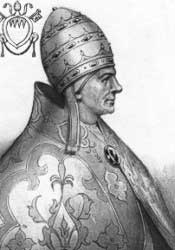Saint Urban V|Catholic Saint
Catholic Saints 28-12-2023, 19:40

Saint Urban V
Catholic Saint
Feast Day : December 19
Also known as: Guillaume de Grimoard; William of Grimoard
The pope who was to take the name Urban V was born to a knightly family in Grisac, in the Languedoc of southern France, in 1310, as William (Guillaume) de Grimoard. He joined the Benedictines at the priory of Chirac, near Grisac, but also was ordained a priest, and pursued an academic career. He studied law, letters and philosophy at universities in Toulouse, Montpellier and Paris, receiving his doctorate in 1342. He became one of the greatest canonists of his day, and taught canon law as a professor at Montpellier as well as in other places.
William served as vicar general at Clermont and Uzès and as prior of Notre-Dame du Pré (a priory dependent on St. Germain d’Auxerre). In 1352, Pope Clement VI (r. 1342–52) appointed him abbot of St. Germain d’Auxerre. He was a papal legate in Italy in 1354 and 1360, then in 1361 Pope Innocent VI (r. 1352–62) sent him to the abbey of St. Victor at Marseilles. William was on a papal mission to Naples when, on September 28, 1362, he learned that Innocent had died and that he had been elected his successor. He returned to Avignon, where the papacy was then based, on October 31, and was consecrated on November 6. He took the name Urban V because, he said, all the popes of that name had been saints. Urban devoted much attention to education, reforming or creating universities (including ones at Cracow in 1364 and Vienna in 1365) and student scholarships. He implemented needed Church reforms, strengthened ecclesiastical discipline, and restored churches and monasteries. He supported the last of the Crusades against the Turks, in which Peter de Lusignan, king of Cyprus, succeeded in taking and temporarily occupying Alexandria in October 1365, but the initiative failed. William was closely involved with affairs of state, but probably the most momentous event of his pontificate was his decision to move the Holy See from Avignon (where it had been based for 50 years) back to Rome.
The decision met universal acclaim from all but the French, who rightly feared a diminution of their influence. Urban nevertheless left Avignon on April 30 and entered Rome on October 16, 1367, after a stay of some months in the citadel at Viterbo. In Rome, he set about restoring the city, reviving religion and tightening clerical discipline. The unemployed were put to work in the neglected gardens of the Vatican, and the papal treasure, which had been preserved at Assisi since the days of Pope Boniface VIII (r. 1294–1303), was distributed among city churches. Urban negotiated a new treaty with German emperor Charles IV and crowned his empress. He also attempted to bridge the schism with the Eastern Church, which seemed to him a permanent injury to Jesus Christ. However, although he reconciled with the Greek emperor, John V Palaeologus, the latter was unable to bring his people along, and the schism persisted. As important a political and religious event as the return to Rome was, political realities made it impossible to sustain. Urban decided to move his court back to Avignon, even though St. Bridget had come to warn him of her premonition that if he did, he would shortly die. He left Rome on September 5, and was back in Avignon on September 24, 1370. Less than three months later, he had his own premonition of impending death, and, not wanting to die in fine sheets, had himself moved from the Papal Palace to his brother’s house at the foot of the hill.
He had all the doors to the street opened, so that he could receive farewell visitors, and expired on December 19. His relics were interred in Notre-Dame des Doms at Avignon, but in accordance with his own wishes, were translated two years later to the abbey church of St. Victor at Marseilles. The many miracles reported at his tomb led to demands for his canonization by King Waldemar of Denmark. Though promised by Gregory XI (r. 1370–78) in 1375, this did not occur, owing to the disorders of the time.

I believe in Jesus -JESUS CHRIST HD-wallpapers I believe in Jesus Free HD-wallpapers Download...
Learn more
Psalm 91:16 BIBLE QUOTES HD-WALLPAPERS FREE DOWNLOAD...
Learn more
Aaron and the Golden Calf. Exodus 32:1-35 Bible Stories Exodus 32:1 Then the people, seeing that Moses made...
Learn more